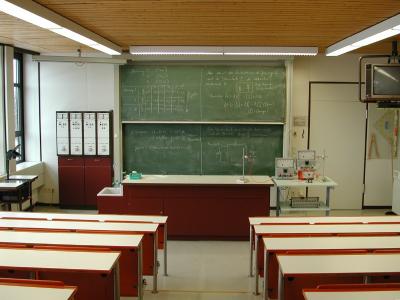This is where I work: My school has two physics rooms, one for student experiments and this one, which is more like an auditorium; students can view demo experiments better in here than in the other room. The photo was taken at the end of a 10th-grade lesson on electrical resistance. Click the image for a larger version. (You can see the famous formula R = U/I on the blackboard; in German U is used for voltage/potential difference instead of V.)
Mit etwa einem Monat Verspätung komme ich jetzt doch noch dazu, es Herrn Rau (sowie einigen anderen Kollegen) nachzutun und ein Foto von meinem Arbeitsplatz zu posten.
Das Bild zeigt einen der beiden Physikräume meiner Schule, nämlich den sogenannten Lehrraum. Er eignet sich gut für Demonstrationsexperimente, da alle Schüler gut nach vorne schauen können, aber er eignet sich auch gut dafür, dass die Schüler viel Blödsinn machen, weil sie statt der üblichen ein bis zwei Banknachbarn plötzlich auch vor und hinter sich mehrere Kameraden in Reichweite haben… also für Oberstufenschüler kein Problem, aber eine Klasse 6 möchte man dort nicht unterrichten.
Das Foto entstand nach einer Physikstunde in Klasse 10 zum Thema elektrischer Widerstand. Die Schüler waren schon in die große Pause verschwunden. Ein Klick auf das Bild führt zu einer größeren Version, auf der man u. a. die berühmte Formel R = U/I an der Tafel sieht. (Nein, es ist nicht das Ohmsche Gesetz; das besagt nämlich, dass U/I = konstant ist und gilt bei vielen Stoffen nur, wenn man die Temperatur konstant hält.)
Nebenbei: Der zweite Physikraum ist der sogenannte Übungsraum mit “normalen” Vierertischen und sehr guter Ausstattung für Schülerexperimente. Glücklicherweise habe ich die meisten Physikstunden in diesem Raum.

